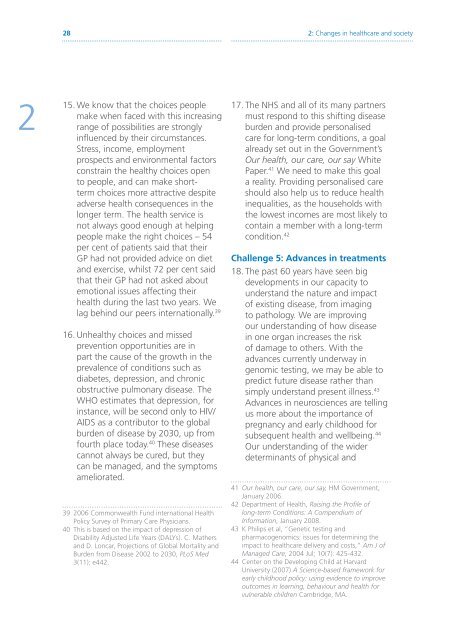High quality care for all NHS Next Stage Review - Antibiotic Action
High quality care for all NHS Next Stage Review - Antibiotic Action
High quality care for all NHS Next Stage Review - Antibiotic Action
You also want an ePaper? Increase the reach of your titles
YUMPU automatically turns print PDFs into web optimized ePapers that Google loves.
28 2: Changes in health<strong>care</strong> and society215. We know that the choices peoplemake when faced with this increasingrange of possibilities are stronglyinfluenced by their circumstances.Stress, income, employmentprospects and environmental factorsconstrain the healthy choices opento people, and can make shorttermchoices more attractive despiteadverse health consequences in thelonger term. The health service isnot always good enough at helpingpeople make the right choices – 54per cent of patients said that theirGP had not provided advice on dietand exercise, whilst 72 per cent saidthat their GP had not asked aboutemotional issues affecting theirhealth during the last two years. Welag behind our peers internation<strong>all</strong>y. 3916. Unhealthy choices and missedprevention opportunities are inpart the cause of the growth in theprevalence of conditions such asdiabetes, depression, and chronicobstructive pulmonary disease. TheWHO estimates that depression, <strong>for</strong>instance, will be second only to HIV/AIDS as a contributor to the globalburden of disease by 2030, up fromfourth place today. 40 These diseasescannot always be cured, but theycan be managed, and the symptomsameliorated.39 2006 Commonwealth Fund international HealthPolicy Survey of Primary Care Physicians.40 This is based on the impact of depression ofDisability Adjusted Life Years (DALYs). C. Mathersand D. Loncar, Projections of Global Mortality andBurden from Disease 2002 to 2030, PLoS Med3(11): e442.17. The <strong>NHS</strong> and <strong>all</strong> of its many partnersmust respond to this shifting diseaseburden and provide personalised<strong>care</strong> <strong>for</strong> long-term conditions, a goalalready set out in the Government’sOur health, our <strong>care</strong>, our say WhitePaper. 41 We need to make this goala reality. Providing personalised <strong>care</strong>should also help us to reduce healthinequalities, as the households withthe lowest incomes are most likely tocontain a member with a long-termcondition. 42Ch<strong>all</strong>enge 5: Advances in treatments18. The past 60 years have seen bigdevelopments in our capacity tounderstand the nature and impactof existing disease, from imagingto pathology. We are improvingour understanding of how diseasein one organ increases the riskof damage to others. With theadvances currently underway ingenomic testing, we may be able topredict future disease rather thansimply understand present illness. 43Advances in neurosciences are tellingus more about the importance ofpregnancy and early childhood <strong>for</strong>subsequent health and wellbeing. 44Our understanding of the widerdeterminants of physical and41 Our health, our <strong>care</strong>, our say, HM Government,January 2006.42 Department of Health, Raising the Profile oflong-term Conditions: A Compendium ofIn<strong>for</strong>mation, January 2008.43 K Philips et al, “Genetic testing andpharmacogenomics: issues <strong>for</strong> determining theimpact to health<strong>care</strong> delivery and costs,” Am J ofManaged Care, 2004 Jul; 10(7): 425-432.44 Center on the Developing Child at HarvardUniversity (2007) A Science-based framework <strong>for</strong>early childhood policy: using evidence to improveoutcomes in learning, behaviour and health <strong>for</strong>vulnerable children Cambridge, MA.





